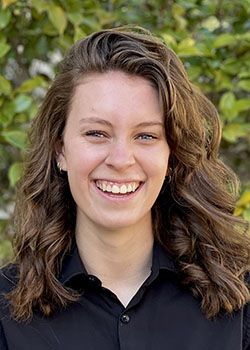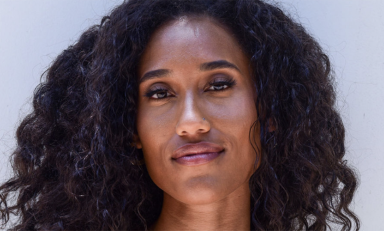
Lily Gebhart ’25, a cognitive science and mathematics major, has been named a 2024 Goldwater Scholar. Gebhart will receive $7,500 each semester for the remainder of her undergraduate education to support her computational cognitive science research.

Working with Associate Professor of Computer Science and Cognitive Science Justin Li, Gebhart is is working to integrate multiple existing and proposed mechanisms for human memory retrieval into a single integrated mechanism to improve both the current understanding of human memory and the operations of artificial intelligence models. On the strength of this research, Gebhart was one of four students selected for Occidental’s 2024–25 Science Scholar cohort.
“The Goldwater Scholarship is one of the most prestigious scholarships bestowed upon students who demonstrate exceptional promise as research scientists, serving as a validation of their hard work and aptitude for hypothesis-driven research,” says Assistant Professor of Chemistry Raul Navarro, who serves as the College’s campus representative for the scholarship. “Oxy has a rich history of thoughtfully engaging students in rigorous research inquiry alongside faculty, and this award is a reflection of this highly personalized and immersive experience.”
Gebhart says that she’s looking forward to the support and collaboration she’ll receive from other undergraduate researchers and Goldwater scholarship recipients.
“I am bound to hit roadblocks in my work,” she says. “The Goldwater community provides me with both a support network, normalizing setbacks in research and the imposter syndrome that often accompanies research success, and a dedicated community of researchers whom I can bounce ideas off of to overcome research setbacks.”
Since 1986, the Goldwater Foundation has provided scholarships to college sophomores and juniors who intend to pursue research careers in the natural sciences, mathematics, and engineering. Gebhart plans to earn a PhD in computational cognitive science, conducting research in cognitive modeling and eventually teaching at the university level. She began to consider pursuing an academic career during the COVID-19 pandemic, when she was a junior in high school.
“Virtual tutoring sparked my interest,” she says. “I’ve always loved teaching; finding the best way to explain a concept to a student and witnessing the ‘a-ha’ moment when they begin to understand is one of the most rewarding experiences I’ve had.”



